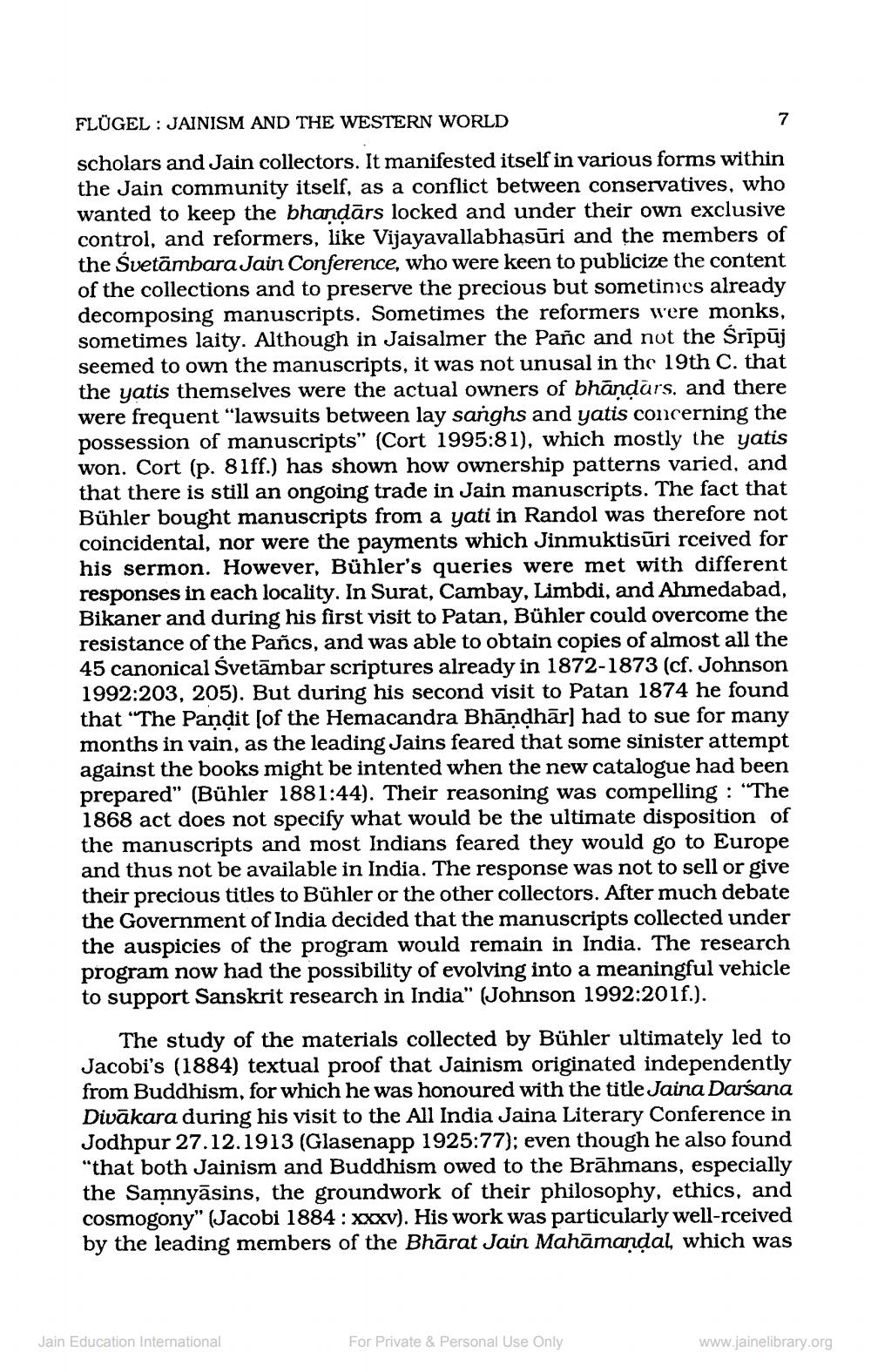Book Title: Jain Journal 1999 07 Author(s): Jain Bhawan Publication Publisher: Jain Bhawan Publication View full book textPage 9
________________ FLÜGEL : JAINISM AND THE WESTERN WORLD scholars and Jain collectors. It manifested itself in various forms within the Jain community itself, as a conflict between conservatives, who wanted to keep the bhandārs locked and under their own exclusive control, and reformers, like Vijayavallabhasūri and the members of the Svetambara Jain Conference, who were keen to publicize the content of the collections and to preserve the precious but sometimes already decomposing manuscripts. Sometimes the reformers were monks, sometimes laity. Although in Jaisalmer the Pañc and not the Sripūj seemed to own the manuscripts, it was not unusal in the 19th C. that the yatis themselves were the actual owners of bhāndars, and there were frequent “lawsuits between lay sanghs and yatis concerning the possession of manuscripts" (Cort 1995:81), which mostly the yatis won. Cort (p. 81ff.) has shown how ownership patterns varied, and that there is still an ongoing trade in Jain manuscripts. The fact that Bühler bought manuscripts from a yati in Randol was therefore not coincidental, nor were the payments which Jinmuktisūri rceived for his sermon. However, Bühler's queries were met with different responses in each locality. In Surat, Cambay, Limbdi, and Ahmedabad, Bikaner and during his first visit to Patan, Bühler could overcome the resistance of the Pañcs, and was able to obtain copies of almost all the 45 canonical Svetāmbar scriptures already in 1872-1873 (cf. Johnson 1992:203, 205). But during his second visit to Patan 1874 he found that “The Pandit (of the Hemacandra Bhāndhār] had to sue for many months in vain, as the leading Jains feared that some sinister attempt against the books might be intented when the new catalogue had been prepared" (Bühler 1881:44). Their reasoning was compelling : “The 1868 act does not specify what would be the ultimate disposition of the manuscripts and most Indians feared they would go to Europe and thus not be available in India. The response was not to sell or give their precious titles to Bühler or the other collectors. After much debate the Government of India decided that the manuscripts collected under the auspicies of the program would remain in India. The research program now had the possibility of evolving into a meaningful vehicle to support Sanskrit research in India” (Johnson 1992:201f.). The study of the materials collected by Bühler ultimately led to Jacobi's (1884) textual proof that Jainism originated independently from Buddhism, for which he was honoured with the title Jaina Darsana Divākara during his visit to the All India Jaina Literary Conference in Jodhpur 27.12.1913 (Glasenapp 1925:77); even though he also found "that both Jainism and Buddhism owed to the Brāhmans, especially the Samnyāsins, the groundwork of their philosophy, ethics, and cosmogony" (Jacobi 1884: xxxv). His work was particularly well-rceived by the leading members of the Bhārat Jain Mahamandal, which was Jain Education International For Private & Personal Use Only www.jainelibrary.orgPage Navigation
1 ... 7 8 9 10 11 12 13 14 15 16 17 18 19 20 21 22 23 24 25 26 27 28 29 30 31 32 33 34 35 36 37 38 39 40 41 42 43 44 45 46 47 48 49 50 51 52 53 54 55 56 57 58 59 60 61 62 63 64 65 66 67 68 69 70 71 72 73
